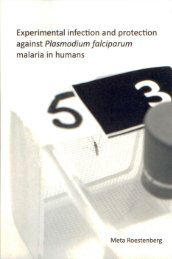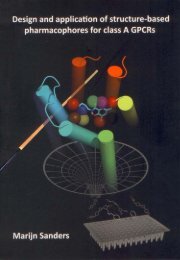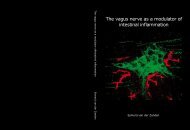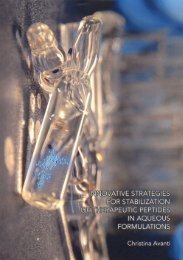Chromosome segregation errors: a double-edged sword - TI Pharma
Chromosome segregation errors: a double-edged sword - TI Pharma
Chromosome segregation errors: a double-edged sword - TI Pharma
You also want an ePaper? Increase the reach of your titles
YUMPU automatically turns print PDFs into web optimized ePapers that Google loves.
1<br />
years before this experimental evidence was published, some of the components that are responsible<br />
for this mitotic checkpoint signal were identified by two independent screens for budding yeast<br />
mutants that were unable to delay mitosis in the presence of microtubule destabilizing drugs 71,72 .<br />
These identified genes included Bub1, Bub3 71 , MAD1, MAD2 and MAD3 72 and were later found to be<br />
conserved in higher eukaryotes 73-76 . All checkpoint components are recruited to outer kinetochores<br />
in prometaphase, where they monitor MT attachment status and delay anaphase onset through<br />
inhibition of the E3 ubiquitin ligase activity of the Anaphase Promoting Complex or Cyclosome<br />
(APC/C). The APC/C is a 1.5-MDa complex which ubiquitinates various substrates important for cell<br />
cycle progression (reviewed in 77 ) by collaborating with three E2 enzymes, UbcH5, UbcH10 and Ube2S<br />
78-81 . The unattached kinetochore is thought to function as a catalytic platform for the generation of<br />
the mitotic checkpoint complex (MCC) 82 , consisting of Mad2, Bub3 and the pseudo-kinase BubR1 83<br />
(Mad3 in budding yeast), which directly binds and sequesters the APC/C co-activator Cdc20 84-94 . By<br />
binding Cdc20, the MCC inhibits the ubiquitination of two APC/C substrates, Securin and Cyclin B1,<br />
whose degradation by the 26S proteasome is necessary for cells to progress into anaphase 95-99 (Fig.4).<br />
The protease Separase is required to separate sister chromatids in anaphase by cleaving the cohesin<br />
complex present in between both DNA strands 99,100 and is kept inactive by its chaperone Securin 101 .<br />
Therefore, degradation of Securin in anaphase is required to allow cohesin cleavage and subsequent<br />
separation of sister chromatids to opposite sides of the cell98-100 . Degradation of Cyclin B1 results in<br />
inactivation of the major mitotic regulator Cyclin B1- Cdk1, an event that is essential for mitotic exit96,97 .<br />
Unattached kinetochores catalyze MCC formation through the presence of a hetero-tetrameric complex<br />
consisting of MAD2 and MAD1 102,103 (Fig.4). MAD2 homodimerization at this kinetochore-bound<br />
complex induces a conformational change in the inactive cytoplasmic form of MAD2, called open- or<br />
O-MAD2, to the active form, termed closed- or C-MAD2 104,105 . This closed form of MAD2 is capable<br />
of forming the MCC complex with BubR1, Bub3 and Cdc20 and therefore to inhibit APC/C activity 106 .<br />
BubR1 binds to the MCC through its conserved N-terminal KEN-box 107-110 , which is a motif specifically<br />
recognized by Cdc20 111 . Another KEN-Box motif in BubR1, more centrally located, can also directly<br />
bind the APC/C and is thought to act as a pseudosubstrate 107,108,110 . The final component of the MCC is<br />
Bub3, which is, besides MCC binding 91 , required for kinetochore localization of both BubR1 and Bub1 76 .<br />
14<br />
MAD1 C-MAD2<br />
Bub1<br />
Bub3<br />
Mps1<br />
BubR1<br />
BubR1<br />
Bub3<br />
O-MAD2<br />
Cdc20<br />
C-MAD2<br />
APC/C<br />
Cdc20<br />
Ub<br />
Ub<br />
Ub<br />
Ub<br />
Cyclin B1<br />
Ub<br />
Ub<br />
Ub<br />
Ub<br />
Securin<br />
Figure 4. Mitotic checkpoint signaling<br />
Mitotic checkpoint components are recruited to unattached kinetochores, thereby creating a platform for the formation of the<br />
Mitotic Checkpoint Complex (MCC) consisting of MAD2, BubR1 and Bub3, which inhibits APC/C dependent Cyclin B1 and Securin<br />
degradation through sequestration of Cdc20.













